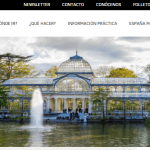The Ministry of Industry, Trade and Tourism, via the State Company for Innovation Management and Tourism Technology (SEGITTUR), is to export its Smart Destination model to Colombia, where it will begin work with the city of Medellín to help it become a Smart Destination.
Medellín, the capital of the Antioquía region in Colombia and the second largest city in the country, has over 2.5 million residents and has been going through a huge transformation over recent years. This has led to it being recognised as the most innovative city in the world in the Wall Street Journal thanks to its promotion of technological, cultural and educational solutions, reflecting a booming culture of entrepreneurship within its population.
The local government of Medellín, via the company Plaza Mayor Medellín Conventions and Exhibitions, has invested in SEGITTUR due to its extensive experience in the project. Its Smart Destination methodology, developed with the Secretary of State for Tourism, has been recognised by international bodies such as the World Tourism Organization, the Organisation for Economic Co-operation and Development, the European Commission and the Inter-American Development Bank.
To the Chairman of SEGITTUR, Enrique Martínez, “It is an honour and a huge responsibility to be able to help Colombia’s second city on its journey to becoming a Smart Destination, which brings with it a series of advantages, such as added value to the destination through innovation and digitalisation, making it more competitive and efficient and boosting the three aspects of sustainable development: environmental, economic and sociocultural.”
To the Medellín Deputy Secretary of Tourism, Ledys Vianey López Zapata, “This is a novel investment: changing the destination’s management model to bring it in line with the initiative to turn Medellín into a Software Valley and democratise the use of technology as a driver for development. The implementation of this model will allow the city to position itself as an attractive destination which has the capacity for transformation, guarantees sustainable development to companies and its population, promotes the generation of income, supports the reignition of the tourism sector and is strengthening its position as an innovative territory.”
To carry out this work, the SEGITTUR team has already held an initial project meeting with Medellín leaders, during which they explained what it means to be a Smart Destination, the methodology they will be working with and the roadmap they’ll be following over the coming weeks.
The work will begin with the analysis of all the city’s information related to the five categories that make up the methodology: governance, innovation, technology, accessibility and sustainability.
Following this, there will be a series of interviews with leaders from different areas of the local government, as well as with bodies directly and indirectly related to tourism, as the Smart Destination project aims to involve everyone, given that tourism is a very cross-cutting sector.
All this work is based around the Secretary of State for Tourism’s Smart Destination methodology, which assesses over 400 requirements linked to the five categories Smart Destinations follow: governance, innovation, technology, accessibility and sustainability.
The results of the meetings and analysis of the information provided by all the agents involved will be used to assess the level to which Medellín complies with each category. This will serve as the basis for the diagnostic report and the action plan to turn it into a Smart Destination.





